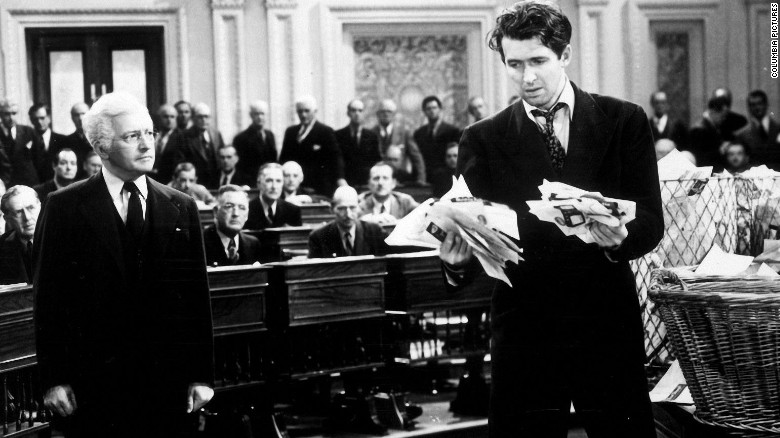In the wake of Senate Minority Leader Chuck Schumer’s threat that “everything is on the table” if Democrats retake the majority this fall, there’s been considerable focus on both what they might consider and whether they will have the votes to do it.
Among the many proposals — add seats to the Supreme Court, grant statehood to DC and Puerto Rico — floated as ways to pay back Republicans for their decision to push a Supreme Court confirmation fight this close to the election, the one that seems the most achievable is the elimination of the filibuster.
The filibuster — essentially the ability of one senator to block a floor vote at any time, a la “Mr. Smith Goes to Washington” — has been eroded steadily over the past few decades.
That process sped up in 2013, when then Senate Majority Leader Harry Reid got rid of the need for 60 votes to end debate over judicial nominations (with the exception of Supreme Court nominees). When Republicans took over the Senate, Majority Leader Mitch McConnell changed the rules again to allow a simple majority vote to end debate on Supreme Court nominees. That’s how both Neil Gorsuch and Brett Kavanaugh wound up on the court. And it’s very likely the way Trump’s soon-to-be announced nominee to replace the late Justice Ruth Bader Ginsburg will be confirmed as well.
The last thread keeping the filibuster in place is that it can be still used to block legislation. Unless 60 votes can be secured to end debate, a single senator can hold up the legislative proceedings of the Senate for as long as he or she wishes. It’s the main difference, other than six-year terms for senators, between the Senate and the House — where majority rules at all times.
There’s no doubt that there will be a number of Senate Democrats willing to put the kibosh on the filibuster entirely if they regain the majority this fall. During the 2020 Democratic primary, Massachusetts Sen. Elizabeth Warren expressed support for getting rid of the filibuster — and that was long before Republicans made clear they planned to try to confirm Trump’s SCOTUS pick.
So the question isn’t whether Schumer would have a decent chunk of Democratic votes if he moved to do away with the filibuster. The question is, would he have the 50 votes he needs to change Senate rules? While some of that depends on whether Democrats can win big this fall, we got some indication this week that the tectonic plates are beginning to move on the issue.
Asked this week by National Review about whether he would support the elimination of the filibuster in its entirety, Montana Sen. Jon Tester said this: “We’ll see what happens in the election, and we’ll see what happens with, you know, potential obstruction.”
That sound you just heard was Tester opening the door to the elimination of the filibuster. Which is interesting for a few reasons.
1) Tester has previously ruled out changing the filibuster rules on legislation. Check out this exchange between National Review and Tester back in November 2019:
“I don’t want to see the Senate become the House,” Montana Senator Jon Tester tells National Review when asked about eliminating the legislative filibuster. Asked if he could imagine any circumstances where he would change his mind about the filibuster, Tester says: “Nope.”
In July, Tester began to ease away from that hard-and-fast “nope.” He said that while he was a “no” on changing the filibuster rules governing legislation, he gave himself the option of rethinking things if Republicans were to “stonewall, stonewall, stonewall.” But he added: “I’ll give them more credit than that and say they’re not going to do that; that’s why I wouldn’t throw it away.”
2) Tester is in a state, Montana, that tends to vote Republican at the presidential level and is sure to be a Republican target when he is up for reelection in 2024.
While Tester denied he has moved positions at all in an interview with National Review — “Nope, that’s always been my view” — there’s clearly a difference between saying “nope” when asked if you would consider changing the filibuster rules and responding “we’ll see what happens in the election, and we’ll see what happens with, you know, potential obstruction.”
Not the same thing.
What’s interesting about all of this is the math of what a Senate majority would look like. Let’s say Democrats wind up with 52 seats following the 2020 election. (Note: The battle for Senate control is a toss-up at this point although Democrats have far more pickup opportunities than Republicans do.)
West Virginia Sen. Joe Manchin and Arizona Sen. Kyrsten Sinema are on record, repeatedly, saying they oppose any erosion of the legislative filibuster. “The whole intention of Congress is basically to have a little bit of compromise with the other side,” Manchin told CNN in late July. “Our job is to find common and cooling ground, if you will, to make something work that makes sense.”
If Schumer lost just those two senators — and Joe Biden, as polling currently suggests, is in the White House — he could still change the rules on the legislative filibuster. (A 50-50 tie would be broken, in this scenario, by Vice President Kamala Harris.)
But if Tester hewed to his original opposition to ending the legislative filibuster, the attempt to change it would fail. However, if he reversed course and backed such a move, well, then … you start to see why his hedge this week matters so much.
All of this depends on lots of “ifs” — the largest is IF Democrats actually win back the Senate majority in 40 days’ time. But IF that comes to pass, Tester may well find himself at the epicenter of the largest change in Senate rules in 100 years.
And his shifting position makes how he would eventually decide on that filibuster vote all the more intriguing.
>>>details

